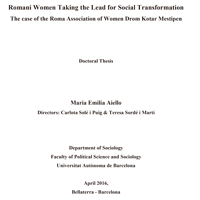Acte de defensa de la tesi d'Emilia Aiello

29/05/2015
On May 25th 2016 the student of Sociology Maria Emilia Aiello will defend her doctoral dissetation "Romani Women Taking the Lead for Social Transformation. The case of the Roma Association of Women Drom Kotar Mestipen" supervised by Dra. Carlota Solé Puig and Dra. Teresa Sordé Martí.
The defense will be held at the Grades Hall of the Faculty of Political Science and Sociology at 10am.
Abstract
The present dissertation examines grassroots’ Romani women social organisation, how they are contributing to the larger Roma Rights’ movement, and also to shape a more inclusive feminism. In doing so, the present investigation general objective is to conduct a sociological study of the organising that fosters and enables the grassroots Romani women to exercise and enhance their human agency as a way of both eradicating discrimination and engaging in a process of individual and collective empowerment.
I conducted a case study of the Roma Association of Women Drom Kotar Mestipen (Road for Freedom, DKM). The research process has been framed under the communicative methodology of research and qualitative methods have been used. The analysis carried out enables to characterise this association with what I have called an emancipatory-oriented approach. Research findings reveal in which ways grassroots Romani women once get involved in DKM they broaden their educational and employment opportunities, as well as their social participation. In all, the dissertation sheds light to how these women’s social mobilisation is having an impact on their own lives (individual), on their families (community) and also on fostering a Romani women’s movement from a grassroots level (societal).
Abstract
The present dissertation examines grassroots’ Romani women social organisation, how they are contributing to the larger Roma Rights’ movement, and also to shape a more inclusive feminism. In doing so, the present investigation general objective is to conduct a sociological study of the organising that fosters and enables the grassroots Romani women to exercise and enhance their human agency as a way of both eradicating discrimination and engaging in a process of individual and collective empowerment.
I conducted a case study of the Roma Association of Women Drom Kotar Mestipen (Road for Freedom, DKM). The research process has been framed under the communicative methodology of research and qualitative methods have been used. The analysis carried out enables to characterise this association with what I have called an emancipatory-oriented approach. Research findings reveal in which ways grassroots Romani women once get involved in DKM they broaden their educational and employment opportunities, as well as their social participation. In all, the dissertation sheds light to how these women’s social mobilisation is having an impact on their own lives (individual), on their families (community) and also on fostering a Romani women’s movement from a grassroots level (societal).